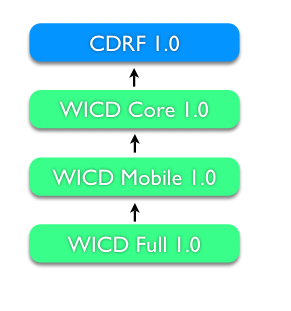This specification defines conformance for several classes of
products:
The key words "MUST", "MUST NOT", "REQUIRED", "SHALL", "SHALL
NOT", "SHOULD", "SHOULD NOT", "RECOMMENDED", "may", and "OPTIONAL"
in this document are to be interpreted as described in
RFC 2119 (see http://www.ietf.org/rfc/rfc2119.txt). However,
for readability, these words do not appear in all uppercase letters
in this specification.
At times, this specification recommends good practice for
authors and user agents. These recommendations are not normative
and conformance with this specification does not depend on their
realization. These recommendations contain the expression "We
recommend ...", "This specification recommends ...", or some
similar wording.
WICD Full 1.0 User Agent Conformance:
-
Conformant WICD Full 1.0 user agents must implement the Compound
Document by Reference Framework 1.0 (CDRF 1.0) including the
extended DOM API's and additional Events.
-
Conformant WICD Full 1.0 user agents must implement WICD Core
1.0.
-
WICD Full 1.0 is a superset of WICD Mobile 1.0.
-
Conformant WICD Full 1.0 user agents must implement WICD Mobile
1.0.
-
Conformant WICD Full 1.0 user agents must support XHTML 1.1 -
Module-based XHTML as root document.
-
Conformant WICD Full 1.0 user agents must support ECMAScript 3rd
Edition as a scripting language.
-
Conformant WICD Full 1.0 user agents must support the Cascading
Style Sheets, level 2 revision 1 [CSS21] specification.
-
When declaring support for WICD Full 1.0, a conforming user
agent should use an "Accept" header with the value:
application/xhtml+xml;
profile="http://www.w3.org/2005/12/wicd".
-
Conformant WICD Full 1.0 user agents must support Document
Object Model (DOM) Level 3 Core Specification.
-
Conformant WICD Full 1.0 user agents must support Document
Object Model (DOM) Level 3 Events Specification.
-
Conformant WICD Full 1.0 user agents must support Document
Object Model (DOM) Level 2 HTML Specification.
